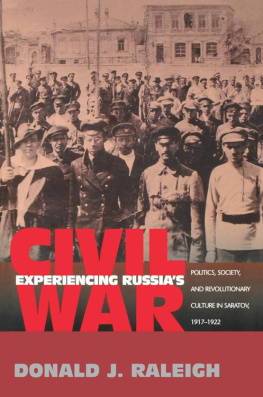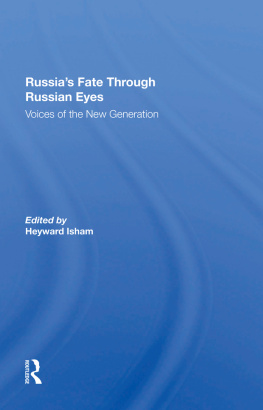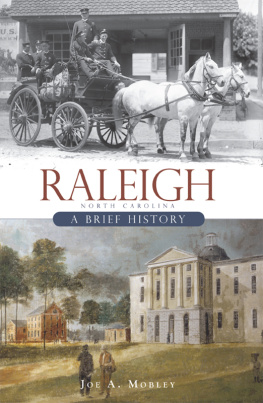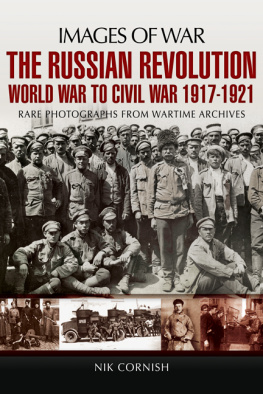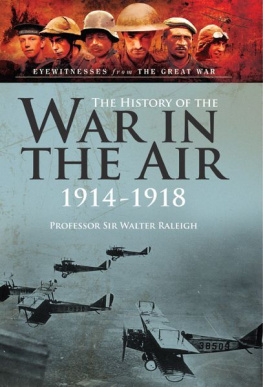Copyright 2002 by Princeton University Press
Published by Princeton University Press, 41 William Street, Princeton, New Jersey 08540
In the United Kingdom: Princeton University Press, 3 Market Place,
Woodstock, Oxfordshire OX20 1SY
All Rights Reserved
Library of Congress Cataloging-in-Publication Data
Raleigh, Donald J.
Experiencing Russias civil war : politics, society, and revolutionary culture in Saratov, 1917-1922 / Donald J. Raleigh.
p. cm.
Includes bibliographical references and index.
ISBN 0-691-03433-8 (alk. paper) - ISBN 0-691-11320-3 (pbk. : alk. paper)
eISBN 978-1-400-84374-9
1. Saratov Region (Russia) History. 2. Soviet Union History Revolution, 1917-1921. I. Title.
DK265.8.S37 R338 2002
947 .460841 - dc21 2002025291
British Library Cataloging-in-Publication Data is available
https://press.princeton.edu
R0
Acknowledgments
I TAKE GREAT pleasure in thanking those many organizations and individuals who contributed to the researching and writing of this book. A study that necessitated more than a dozen trips to the Soviet Union and Russia could not have been completed without generous financial backing. Fulbright-Hays and International Research and Exchanges Board (IREX) fellowships enabled me to launch this project in 1986. With monies provided by the National Endowment for the Humanities and the United States Information Agency, IREX supported additional research trips in 1988,1990, and 1992. A fellowship from the Hoover Institution, funded by the U.S. Department of States discretionary grant program, based on the Soviet-Eastern European Research & Training Act of 1983, Public Law 98-164, Title VIII, 97 Stat. 1047-50, permitted me to spend a summer working in the Bay Area. Fellowships during the 1991-92 academic year from the National Humanities Center, the National Endowment for the Humanities, and the American Council of Learned Societies made it possible for me to start the project over once the Gorbachev Revolution made available heretofore off-limit Russian archives. A University of North Carolina Kenan Competitive Leave, an Institute for Arts and Humanities Fellowship, and a research and study leave from the Department of History freed me from my teaching responsibilities so that I could draft and revise this book, while several awards from the University Research Council and funds from my Pardue professorship subsidized annual summer visits to Saratov.
I am grateful for the opportunity to acknowledge the archives, libraries, and museums where I conducted my research, and those individuals who made important contributions to it. In the United States I carried out research at the Hoover Institution on War, Revolution, and Peace, the Library of Congress, the New York Public Library, the University of Hawaiis Hamilton Library, the University of Illinois at Champaign-Urbana Library, the University of North Carolinas Davis Library, and Columbia Universitys Butler Library. In Russia, I researched this book at the Russian State (Lenin) Library and Fundamental Library of the Social Sciences (INION) in Moscow, at the Library of the Academy of Sciences and the Saltykov-Shchedrin (Public) Library in St. Petersburg, and at the Research Library of Saratov University, where I was aided enormously by the late Vera Aleksandrovna Artisevich. I also located valuable materials at the Central Historical Museum (Moscow), and at the Saratov, Balashov, and Khvalynsk Local Studies Museums.
I wish to record my appreciation to the staffs of the State Archive of the Russian Federation (GA RF) and the Russian State Archive of Socio-Political History (RGASPI, the former Communist Party Archive) in Moscow. I am especially indebted to the truly exceptional archivists at the State Archive of Saratov Oblast (GASO), particularly to Z. E. Gusakova and her coworkers (G. A. Dziakovich, G. P. Koreykova, H. I. Shirova, A. S. Maiorova, N. V. Samokhvalova, G. B. Kuliavtseva, and others), who extended to me (and my students) not only every professional courtesy, but also sincere human warmth and concern. Their attentiveness, quality research assistance, genuine interest in my project, and friendship made it difficult for me to work in other repositories! Thanks too to the archivists at the Center for the Documentation of Modern History of Saratov Oblast (TsDNISO, the former oblast Communist Party archive), and to the branch of GASO in the city of Balashov.
I wish to express my personal and professional gratitude to those Saratov colleagues and friends who supported my first trip to the banks of the Volga: V. S. Semenov, V. I. Nikolaeva, A. V. Rodionov, I. R. Pleve, the late I. D. Parfenov, and the late S. V. Katkov. The wisdom, friendship, irreproachable professionalism, and unfaltering support of N. I. Deviataikina sustained me throughout the research and writing of this book. So did the close companionship and ready assistance of A. A. Kreder, whose untimely death in 2000 deprived those of us who befriended him of a dignified, generous colleague. A. A. German, A. I. Avrus, V. S. Mirzekhanov, and D. I. Trubetskov provided regular doses of encouragement. I also thank E. A. Abrosimova, R. M. Bazyleva, O. V. Kachaeva, I. V. Gorfinkel, V. A. Dines, S. V. Sushchenko, A. V. Voronezhtsev, E. R. larskaia-Smirnova, P. V. Romanov, G. N. Koloiarskii, O. Iu. Abakumov, S. M. Levin, V. A. Mitrokhin, A. G. Riabkov, lu. A. Safronov, S. Iu. Shenin, F. A. Rashitov, and V. M. Zakharov. V. V. Gleizer, G. A. Mishin, and V. A. Solomonov kindly shared materials with me held in their private collections. David E. Barclay, Peter Holquist, Edward Kasinec, Patricia Polansky, and Nadia Zilper brought sources to my attention that otherwise might have eluded me.
I have been especially fortunate to have received invaluable help at the writing stage. A sympathetic but critical colleague and friend, Louise McReynolds, read the first draft of the book, pushed me to clarify my ideas and develop my arguments, and provided stimulating intellectual companionship over the years. Jonathan Wallace applied his expert editorial skills to the same draft. Alexander Rabinowitch, whose encouragement and support have been unwavering, carefully critiqued a revised version of the manuscript, making numerous suggestions for improving it. Betsy Jones Hemenway, Paula Michaels, Beth Holmgren, and Barbara Harris offered sound advice on individual chapters. Peter Holquists generous and meticulous reading of the penultimate draft helped me sharpen the final version. I also acknowledge the ideas for improving the manuscript of the anonymous readers at Princeton University Press, and of my editor, Brigitta van Rheinberg, who convinced me that a shorter manuscript would make a better book. My copy editor, Jodi Beder, edited the volume with great care. Sharon Kowalsky ably prepared the index. It goes without saying that none of these individuals is responsible for the views expressed in the study, or for any remaining errors.


